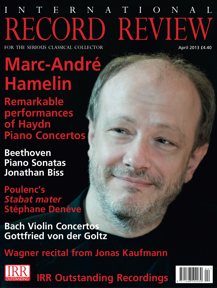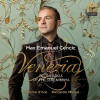Texte paru dans: / Appeared in: |
|
|
Reviewer: John T Hughes Frédéric Delaméa, whose notes are always worth reading, informs us that in Vivaldi’s time Venice had six operatic venues and says that despite its loss of ‘political and financial pre-eminence, Venice still reigned supreme as a cultural capital ... and its reputation as an operatic centre shone as brightly as ever’. The arias chosen for this programme are from the years 1708-34, and it is one from Caldara’s 1732 opera Adriano in Siria which launches this CD a scurrying and intricate melody replete with flowing vocal runs, which both Max Emanuel Cencic and the euphonious Il Pomo d’Oro dispatch with skill. The orchestra includes theorbo, archlutes and guitars, and in Porta’s ‘Mormorando quelle frondi’ one hears their pleasing sound from beginning to end, over which voice and strings move easily through this less ornate aria. Following it is one of two (the last two named in our title) which, Delaméa tells us, were only recently discovered, together with Vivaldi’s opera Argippo, and as yet Vivaldi’s authorship has not been proved. A’ piedi miei svenato is an aria in which the character promises revenge and finds Cencic threateningly employing a full tone in the rapid tempo. Even more testing is the second of these pieces, Anche in mezzo a perigliosa, which begins with Cencic at the bottom of his compass before his scintillating divisions take over. Between these two arias is the earliest one on the disc: Flavio’s delectable ‘Dolce mio ben, mia vita’ from Gasparini’s Flavio Amicio Olibrio, in which Cencic’s voice is at its sweetest. Because the orchestra is reduced one can hear the words clearly, whereas there is a tendency in faster music for the voice to be slightly covered. Words are clear also in the long aria (9’36”) from Merope by Giacomelli, affording an opportunity for Cencic to make use of a strong, dark hue among a range of colours as Epitide expresses his despair: no vivid displays of agility but a more intense outpouring. Readers who have the recommended ‘Drama Queens’ of Joyce DiDonato, which I praised in February, will find another impressive aria from Merope: ‘Sposa, son disprezzata’. From the aforementioned Argippo attributed to Vivaldi comes another bravura aria, through which Cencic sails surely, with all those rapid notes in place, as they are in ‘Mi vuoi tradire, lo so’, verified Vivaldi, in which a deceitful heart is the cause of Melindo’s anger. Apparently, this opera, La verità in cimento of 1720, ‘incurred the wrath of Venice ‘s conservative nobility and forced Vivaldi into artistic exile for the best part of five years’. In 1733, however, he wrote Motezuma for the same theatre, the Teatro S. Angelo, from which is taken ‘Quel rossor che in volto miri’, a big aria that allows the singer to be expansive of tone in its rather grand construction, drawing from Cencic the richest aspects of his vocal production. Albinoni’s II nascimento de l’Aurora is not an opera but a serenata. Singing about flowers is not uncommon in opera (try to produce a mental list as you next walk to the shops or the station); fewer examples exist with regard to trees, but singing to trees is more unusual (an aria to lime trees exists in Smetana’s Libuse and there is, of course, ‘Ombra mai fu’ in Serse). In ‘Pianta bella, pianta amata’, Apollo addresses the ‘Fair tree, beloved tree’. A lovely aria, it lies right in the embracing warmth of Cencic’s middle range and has the calming accompaniment of a viola, sensitively played by Stefano Marcocchi, and theorbos/archlutes. Quite different is the final selection, that from Selitto’s Nitocri. This composer must be the most obscure here, so neglected that the booklet is undecided on whether to accord him one ‘1’ or two, so Delaméa’s notes have single letter whereas other references here give two. He lived from 1700 to 1777 and his opera dates from 1733. ‘Anche un misero arboscello’ (‘Although a spindly sapling’) says simply that such a plant looks less imposing than taller trees but its strength will increase. There is nothing there to set the pulses beating but the aria is a sizzler, requiring and receiving the utmost in virtuosity. One wonders how and where Cencic manages to breathe. Slightly too much reverberation and the orchestra rather too forward mask some words, but it remains a fitting conclusion to this CD. The orchestra does play well under Riccardo Minasi’s effervescent conducting (or leadership, as he is the first violin). |
|
|
|
|
|
Cliquez l'un ou l'autre
bouton pour découvrir bien d'autres critiques de CD |
|




